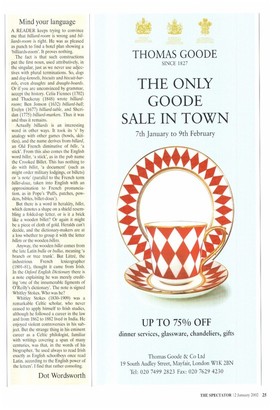Mind your language
A READER keeps trying to convince me that billiard-room is wrong and bil
liards-room is right. He was as pleased as punch to find a hotel plan showing a 'billiards-room'. It proves nothing.
The fact is that such constructions put the first noun, used attributively, in the singular, just as we never use adjec
tives with plural terminations. So, dogs and dog-kennels, biscuits and biscuit-bar
rels, even draughts and draught-boards.
Or if you are unconvinced by grammar, accept the history. Celia Fiennes (1702)
and Thackeray (1848) wrote billiardroom: Ben Jonson (1632) billiard-ball; Evelyn (1677) billiard-table, and Sheridan (1775) billiard-markers. Thus it was and thus it remains.
Actually billiards is an interesting word in other ways. It took its 's' by analogy with other games (bowls, skittles), and the name derives from billard, an Old French diminutive of bilk, 'a stick'. From this also comes the English word billet, 'a stick', as in the pub name the Crooked Billet. This has nothing to do with billet, 'a document' (such as might order military lodgings, or billets) or 'a note' (parallel to the French term billet-doux, taken into English with an approximation to French pronunciation, as in Pope's 'Puffs, patches, powders, bibles, billet-doux).
But there is a word in heraldry, billet, which denotes a shape on a shield resembling a folded-up letter, or is it a brick like a wooden billet? Or again it might be a piece of cloth of gold. Heralds can't decide, and the dictionary-makers are at a loss whether to group it with the letter billets or the wooden billets.
Anyway, the wooden billet comes from the late Latin bulb or bullus, meaning 'a branch or tree trunk'. But Entre. the industrious French lexicographer (1801-81), thought it came from Irish. In the Oxford English Dictionary there is a note explaining he was merely crediting 'one of the innumerable figments of O'Reilly's dictionary'. The note is signed Whitley Stokes. Who was he?
Whitley Stokes (1830-1909) was a remarkable Celtic scholar, who never ceased to apply himself to Irish studies, although he followed a career in the law and from 1862 to 1882 lived in India. He enjoyed violent controversies in his subject. But the strange thing in his eminent career as a Celtic philologist, familiar with writings covering a span of many centuries, was that, in the words of his biographer, 'he used always to read Irish exactly as English schoolboys once read Latin, according to the English power of the letters'. I find that rather consoling.
Dot Wordsworth


























































 Previous page
Previous page